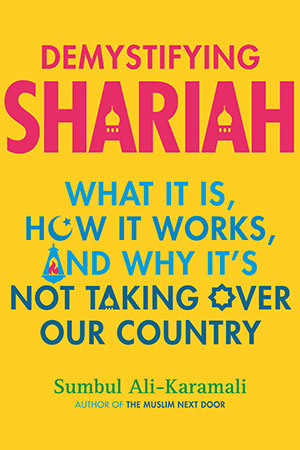Demystifying Shariah: What It Is, How It Works, and Why It’s Not Taking Over Our Country
Posted on August 18, 2020 by PLT Staff

From the publisher:
Through scare tactics and deliberate misinformation campaigns, anti-Muslim propagandists insist wrongly that shariah is a draconian and oppressive Islamic law that all Muslims must abide by. They circulate horror stories, encouraging Americans to fear the “takeover of shariah” law in America and even mounting “anti-shariah protests” . . . . with zero evidence that shariah has taken over any part of our country. (That’s because it hasn’t.) It would be almost funny if it weren’t so terrifyingly wrong—as puzzling as if Americans suddenly began protesting the Martian occupation of Earth.
Demystifying Shariah explains that shariah is not one set of punitive rules or even law the way we think of law—rigid and enforceable—but religious rules and recommendations that provide Muslims with guidance in various aspects of life. Sumbul Ali-Karamali draws on scholarship and her degree in Islamic law to explain shariah in an accessible, engaging narrative style—its various meanings, how it developed, and how the shariah-based legal system operated for over a thousand years. She explains what shariah means not only in the abstract but in the daily lives of Muslims. She discusses modern calls for shariah, what they mean, and whether shariah is the law of the land anywhere in the world. She also describes the key lies and misunderstandings about shariah circulating in our public discourse, and why so many of them are nonsensical.
This engaging guide is intended to introduce you to the basic principles, goals, and general development of shariah and to answer questions like: How do Muslims engage with shariah? What does shariah have to do with our Constitution? What does shariah have to do with the way the world looks like today? And why do we all—Muslims or not—need to care?
- Publication Information
- Author: Sumbul Ali-Karamali
- Publication Type: Book
- Publisher:Beacon Press
- Date of Publication:August 2020
- Purchase: Buy this publication »
